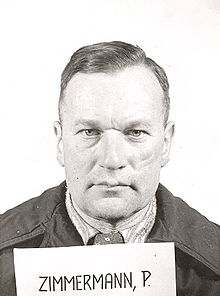Paul Zimmermann (SS member)
Paul Zimmermann (born July 2, 1895 in Münster ; † May 21, 1980 ibid) was a German National Socialist and SS leader , most recently with the rank of SS brigade leader and major general of the police. During the Second World War , he was SS and Police Leader in occupied Ukraine and Italy.
Life
Zimmermann was the son of a regional building councilor. After attending school in Hanover, Zimmermann studied building science and geopolitics and graduated with a degree in engineering. He then worked for the Reichsbahn and companies involved in bridge construction.
In 1931 Zimmermann joined the NSDAP ( membership number 940.783). In 1932 he was "Gau worker" of the party's labor service for the Gau Westfalen-Nord. After the National Socialists came to power in the spring of 1933, Zimmermann was appointed Arbeitsgaufführer of the newly created State Labor Service (Reichsarbeitsdienst) for the North Westphalia district and held this position until June 1936. On August 1, 1933, Zimmermann joined the SS (SS no. 276,856) and was appointed SS-Oberführer on April 20, 1938 and finally SS- Brigadführer on August 1, 1940.
In 1933 he briefly became a member of the Provincial Parliament of the Province of Westphalia . In the Reichstag election in the German Reich in 1936 , Zimmermann ran as Dipl.-Ing. and Oberstarbeitsführer unsuccessful for a mandate from the NSDAP. In 1936 he became head of the National Political Education Institute in Plön . In the same year he served for a few months as staff leader of the SS upper section Elbe and in 1937 moved to the Reich Ministry of Economics as head of the Reich Office for Metals . Now Reich Commissioner for Metals , he was a member of the Board of Trustees of the Kaiser Wilhelm Institute for Metal Research from October 1938 .
During the Second World War , Zimmermann was appointed head of war administration in the Eastern Economic Staff in 1941 . At first he headed the chief economics group of Wiln Nord and from 1942 group III Wi a (Baltic States) within the chief group economic cooperation in the Reich Ministry for the Occupied Eastern Territories (RMO) . According to the historian Christian Gerlach , he was "a specialist Himmler for important economic orders" of the Schutzstaffel in the context of the intended economic exploitation of the German-occupied Soviet territories. He was also a liaison officer from the RMO to the OKH in 1942/43 . He was also entrusted with setting up a civil administration in Azerbaijan, where the oil, which is essential for the war effort, was to be extracted.
In January 1943 he was appointed major general of the police. From mid-February 1943 he was assigned to the Higher SS and Police Leader Russia-Center in Mogilew for training . From May to October 1943 he held the position of SS and Police Leader (SSPF) in Nikolajew . He then worked in Italy at the Higher SSPF, among other things, to fight strikes and met there with General Representative Rudolf Rahn . Most recently, he was employed in the armed forces at OKW.
At the end of the war, Zimmermann became an American prisoner of war. He was interrogated as a witness during the Nuremberg Trials . In the post-war period he is said to have worked in industry. In 1952 he can be proven to be a member of the Naumann district who wanted to infiltrate the FDP . In this context he was briefly detained in mid-January 1953.
literature
- Ernst Klee : Personal Lexicon for the Third Reich. Fischer Verlag, Frankfurt am Main 2003, ISBN 3-10-039309-0
- Alfred Bruns (Ed.), Josef Häming (compilation): The Members of the Westphalia Parliament 1826–1978 (= Westphalian source and archive directories, Volume 2). Landschaftsverband Westfalen-Lippe, Münster 1978, p. 670.
Web links
- Protocols of interrogations of Zimmermann in the archive of the Institute for Contemporary History (PDF; 4.5 MB)
Individual evidence
- ↑ a b c Ernst Klee: Das Personenlexikon zum Third Reich , Frankfurt am Main 2007, p. 696
- ↑ a b c d Christian Gerlach : Calculated murders. The German economic and extermination policy in Belarus 1941 to 1944. Hamburger Edition , Hamburg 1999, p. 443, FN 727
- ↑ a b c d Rüdiger Hachtmann: Science Management in the Third Reich. History of the General Administration of the Kaiser Wilhelm Society , Vol. 2. Göttingen 2007, p. 231
- ↑ Rüdiger Hachtmann : A success story? Spotlights on the history of the general administration of the Kaiser Wilhelm Society in the “Third Reich”, in: Research program “History of the Kaiser Wilhelm Society under National Socialism” , results Vol. 19, Berlin 2004, p. 10.
- ^ Christian Gerlach: Calculated murders. The German economic and extermination policy in Belarus 1941 to 1944. Hamburger Edition , Hamburg 1999, p. 58
- ↑ Martin Seckendorf, A new document on the German occupation policy in Italy , in: Communications of the Berlin Society for Fascism and World War Research, 2005 http://www.2i.westhost.com/bg/ ( Memento from September 27, 2013 in the Internet Archive )
- ↑ Heiko Buschke: German press, right-wing extremism and the National Socialist past in the Adenauer era . Campus, Frankfurt 2003, ISBN 3-593-37344-0 , p. 242
| personal data | |
|---|---|
| SURNAME | Carpenter, Paul |
| BRIEF DESCRIPTION | German National Socialist and civil servant |
| DATE OF BIRTH | July 2, 1895 |
| PLACE OF BIRTH | Muenster |
| DATE OF DEATH | May 21, 1980 |
| Place of death | Muenster |
